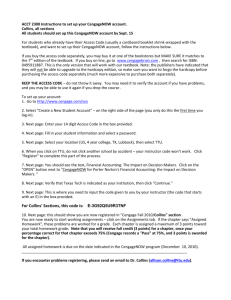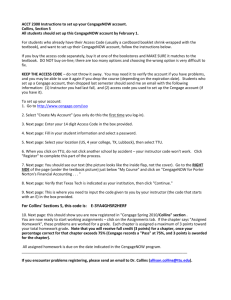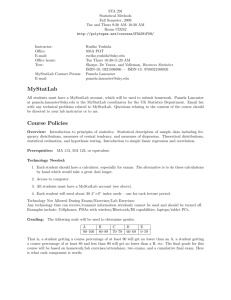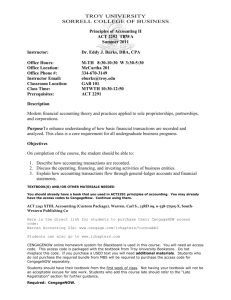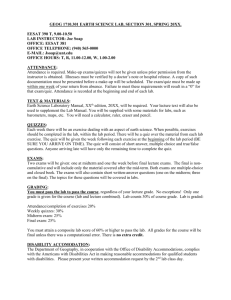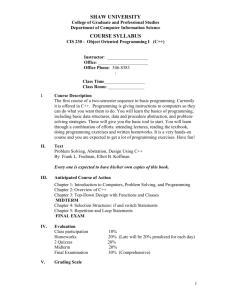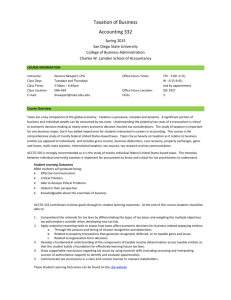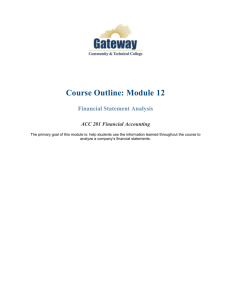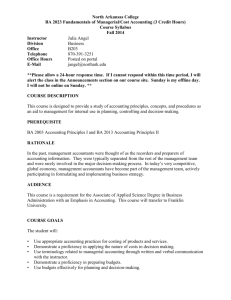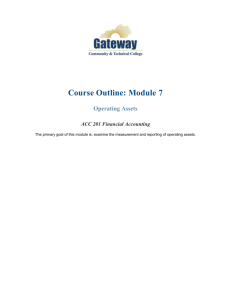CengageNow - Ruriko Yoshida
advertisement
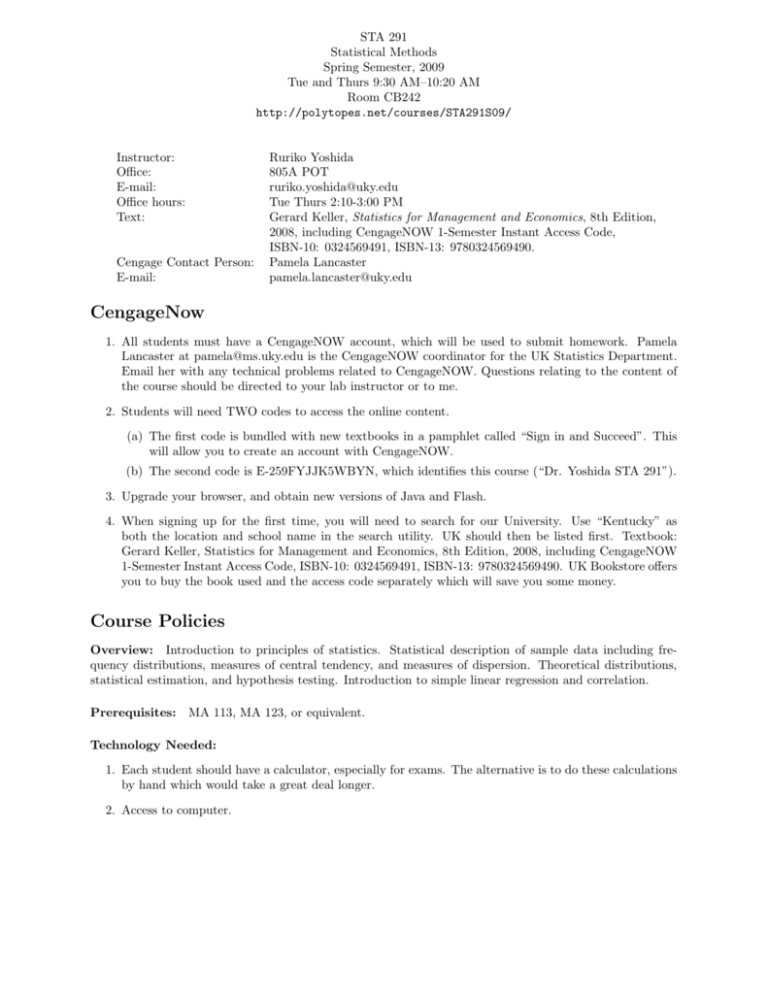
STA 291 Statistical Methods Spring Semester, 2009 Tue and Thurs 9:30 AM–10:20 AM Room CB242 http://polytopes.net/courses/STA291S09/ Instructor: Office: E-mail: Office hours: Text: Cengage Contact Person: E-mail: Ruriko Yoshida 805A POT ruriko.yoshida@uky.edu Tue Thurs 2:10-3:00 PM Gerard Keller, Statistics for Management and Economics, 8th Edition, 2008, including CengageNOW 1-Semester Instant Access Code, ISBN-10: 0324569491, ISBN-13: 9780324569490. Pamela Lancaster pamela.lancaster@uky.edu CengageNow 1. All students must have a CengageNOW account, which will be used to submit homework. Pamela Lancaster at pamela@ms.uky.edu is the CengageNOW coordinator for the UK Statistics Department. Email her with any technical problems related to CengageNOW. Questions relating to the content of the course should be directed to your lab instructor or to me. 2. Students will need TWO codes to access the online content. (a) The first code is bundled with new textbooks in a pamphlet called “Sign in and Succeed”. This will allow you to create an account with CengageNOW. (b) The second code is E-259FYJJK5WBYN, which identifies this course (“Dr. Yoshida STA 291”). 3. Upgrade your browser, and obtain new versions of Java and Flash. 4. When signing up for the first time, you will need to search for our University. Use “Kentucky” as both the location and school name in the search utility. UK should then be listed first. Textbook: Gerard Keller, Statistics for Management and Economics, 8th Edition, 2008, including CengageNOW 1-Semester Instant Access Code, ISBN-10: 0324569491, ISBN-13: 9780324569490. UK Bookstore offers you to buy the book used and the access code separately which will save you some money. Course Policies Overview: Introduction to principles of statistics. Statistical description of sample data including frequency distributions, measures of central tendency, and measures of dispersion. Theoretical distributions, statistical estimation, and hypothesis testing. Introduction to simple linear regression and correlation. Prerequisites: MA 113, MA 123, or equivalent. Technology Needed: 1. Each student should have a calculator, especially for exams. The alternative is to do these calculations by hand which would take a great deal longer. 2. Access to computer. 3. All students must have a CengageNOW account (see above). Go to http://academic.cengage.com/ login to log on. Choose “Create an Account”, “Student”, and then the content access code that comes with your textbook. The course key, a second, different key, is E-259FYJJK5WBYN. 4. Each student will need about 30 4”×6” index cards – one for each lecture period. Technology Not Allowed During Exams/Exercises/Lab Exercises: Any technology that can receive/transmit information wirelessly cannot be used and should be turned off. Examples include: Cellphones, PDAs with wireless/Bluetooth/IR capabilities, laptops/tablet PCs. Grading: The following scale will be used to determine grades: A 90–100 B 80–89 C 70–79 D 60–69 E 0–59 That is, a student getting a course percentage of at least 90 will get no lower than an A, a student getting a course percentage of at least 80 and less than 90 will get no lower than a B, etc. The final grade for this course will be based on homework/lab exercises/attendance, two exams, and a cumulative final exam. Here is what each component is worth: Lab Exercises Short-Answer Questions in the Lecture Midterm Exam #1 on date February 17 (location TBA) Midterm Exam #2 on date April 7 (location TBA) Final Exam on Thursday, May 5th, 6 - 8 PM (location TBA) 10% 10% 20% 20% 25% Exams: This course has common midterm and final exams. Midterm exams are scheduled for Tuesdays February 17, 5-7 PM and Tuesdays April 7, 5-7 PM. There will be an alternate exam times running from 7:00 PM – 11:00 PM on these same evenings, which is for students who have a conflict with Tuesday courses meeting during the regular exam time. You must contact us in advance if you cannot take the exam during the regular 5 – 7 pm time. The cumulative final exam will be on Thursday, May 5th, 6 - 8 PM. Make-up exams will be allowed only in extreme circumstances and are subject to proper documentation. Unless it is an emergency situation, you need to notify me ahead of time either by phone or via email. It is the students’ responsibility to check conflicts of exam dates (or any class activity) with religious holidays. If there is a conflict, you must notify the instructor in writing (email is fine) by the end of the second week of classes. Homework: Suggested problems are selected from the text, and these problems will not be graded. Using CengageNOW, we will give about weekly homework assignments that are graded. The online assignments will be due (usually) Saturdays at 11 PM. The homework solutions must be your own work. Late homework will not be accepted (i.e., given full credit) without a university excused absence. Lab Exercises: Lab Exercises are typically based on the suggested homework and will be given during recitation. The emphasis will be on calculations and the use of formulas. Usually, the exercise will consist of 1 to 3 problems. One-third of the lab grade will be based on turning in an original copy, taken from a physical medium (newspaper, magazine, pamphlet, etc.), of a statistic. This will not begin until the second week of laba particular documentation must accompany the statistic to earn full credit. The two lowest (total lab) grades will be dropped. For lab exercises, no make-ups will be allowed without a university excused absence. Attendance: Consistent attendance is strongly recommended and also part of the grade calculation (see above). Attendance will be taken during lecture. It will usually be recorded via an extremely short question or survey. The two lowest attendance points will be dropped. Each student is responsible for obtaining all material missed when absent. Syllabus: The syllabus will be followed closely, but it is subject to changes. Cellphones: Cellphones need to be turned off during class time and exams.
